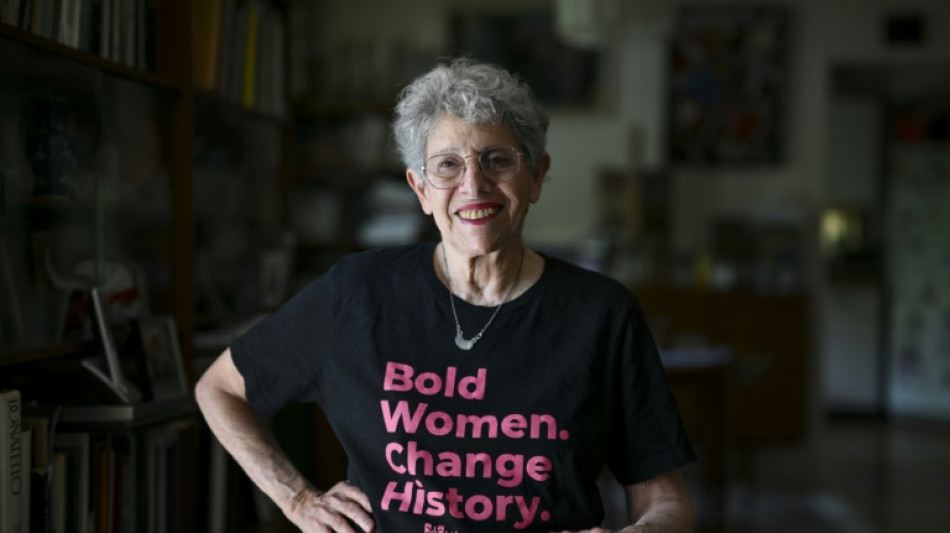
-
 Snoop Dogg 'in love' with Australian Rules football
Snoop Dogg 'in love' with Australian Rules football
-
Former NBA star Harrell axed by Adelaide 36ers over drugs

-
 Townsend pulls out of Beijing following 'crazy' Chinese food post
Townsend pulls out of Beijing following 'crazy' Chinese food post
-
Under promise, over deliver? China unveils new climate goals

-
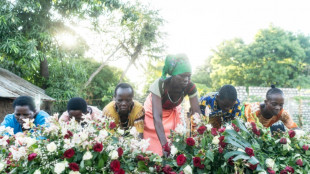 'Morgue is full': how Kenyan starvation cult kept killing
'Morgue is full': how Kenyan starvation cult kept killing
-
Nickel mining threatens Indonesia coral haven, NGOs warn

-
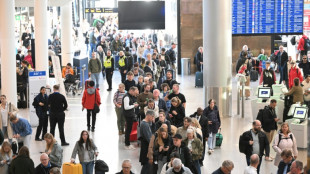 Drones fly over multiple Danish airports
Drones fly over multiple Danish airports
-
Raleigh reaches 60 homers as Mariners clinch first division title since 2001

-
 Savea leads 'stung' All Blacks, Wallaby Slipper to hit 150 Test milestone
Savea leads 'stung' All Blacks, Wallaby Slipper to hit 150 Test milestone
-
Morocco High Atlas whistle language strives for survival
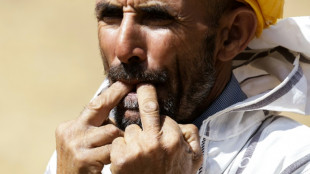
-
 Glimmering sea of solar as China expands desert installation
Glimmering sea of solar as China expands desert installation
-
France's Sarkozy set to learn fate in Libya case

-
 Clean-up underway in southern China after Typhoon Ragasa sweeps through
Clean-up underway in southern China after Typhoon Ragasa sweeps through
-
Apple asks EU to scrap landmark digital competition law

-
 Asian markets slide as traders prepare for key US data
Asian markets slide as traders prepare for key US data
-
Return of millions of Afghans fuels terror potential

-
 Savea to lead 'stung' All Blacks as Robertson makes four changes
Savea to lead 'stung' All Blacks as Robertson makes four changes
-
'Shut your mouth': Low-paid women still waiting for their #MeToo

-
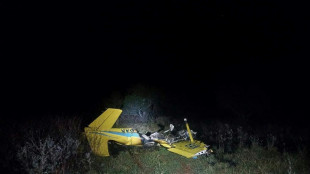 Famed 'sponge cities' Chinese architect dead in Brazil plane crash
Famed 'sponge cities' Chinese architect dead in Brazil plane crash
-
Palestinian leader to address UN as peace push gathers steam

-
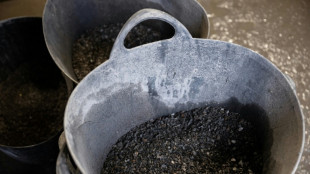 Canada's Indigenous wary of mining push in rich 'Ring of Fire'
Canada's Indigenous wary of mining push in rich 'Ring of Fire'
-
Trump visit adds to intensity as Ryder Cup looms

-
 Savea to lead All Blacks as four changes made to face Wallabies
Savea to lead All Blacks as four changes made to face Wallabies
-
Kimmel scores decade-high ratings amid Trump fight: Disney

-
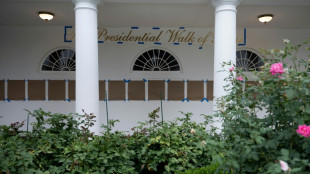 Trump trolls Biden with White House 'autopen' portrait
Trump trolls Biden with White House 'autopen' portrait
-
Low bar, high hopes: China unveils new climate goals

-
 Under-fire Brazil Senate scraps immunity bid
Under-fire Brazil Senate scraps immunity bid
-
Donald and Bradley tout respect, trade jabs at Ryder Cup opening ceremony

-
 Escalatorgate: Trump demands probe into UN 'triple sabotage'
Escalatorgate: Trump demands probe into UN 'triple sabotage'
-
In first, China unveils specific emissions targets
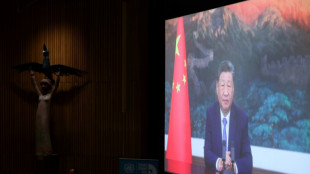
-
 Alvarez hat-trick helps Atletico edge Rayo thriller
Alvarez hat-trick helps Atletico edge Rayo thriller
-
Con job? Climate change is my job, says island nation leader

-
 US stocks fall again while Alibaba gains on big AI push
US stocks fall again while Alibaba gains on big AI push
-
Forest denied winning European return by Antony, Roma down Nice

-
 Postecoglou's Forest held by Antony's Betis on European return
Postecoglou's Forest held by Antony's Betis on European return
-
Eze nets first goal as Arsenal join Man City in League Cup last 16

-
 Guardians' Fry has facial fractures after taking fastball to face
Guardians' Fry has facial fractures after taking fastball to face
-
Giants to go with rookie QB Dart, bench NFL veteran Wilson

-
 Police clashes mar rally for Uganda opposition leader Bobi Wine
Police clashes mar rally for Uganda opposition leader Bobi Wine
-
China unveils steady but restrained climate goals

-
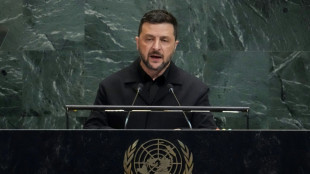 Trump 'incredibly impatient' with Russia on Ukraine, VP Vance says
Trump 'incredibly impatient' with Russia on Ukraine, VP Vance says
-
France, US tell Iran still chance to avoid nuclear sanctions

-
 Big news: Annual eating contest roars to life in Fat Bear Week
Big news: Annual eating contest roars to life in Fat Bear Week
-
In UN debut, new Syria leader warns on Israel but backs dialogue

-
 Malawi's ex-president Mutharika returns to power in crushing vote win
Malawi's ex-president Mutharika returns to power in crushing vote win
-
Under-fire Brazil senators scrap immunity bid

-
 Morikawa calls on US Ryder Cup fans 'to go crazy'
Morikawa calls on US Ryder Cup fans 'to go crazy'
-
India see off Bangladesh to book Asia Cup final spot

-
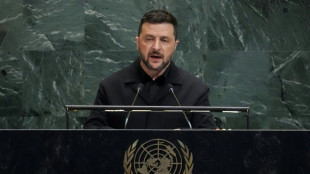 Rubio calls for Russia to stop the 'killing' in Ukraine
Rubio calls for Russia to stop the 'killing' in Ukraine
-
Macron tells Iran president only hours remain to avert nuclear sanctions


Ex-members of secret US abortion group fear return to dark era
They were once part of an underground network that helped an estimated 11,000 women get abortions before the US Supreme Court established a constitutional right to the procedure in 1973.
More than 50 years on, former members of the "Jane Collective" are watching in disbelief as America slides back toward the era they risked everything to end.
"I was crushed," recalls Abby Pariser, speaking to AFP ahead of the third anniversary on June 24 of the landmark Dobbs decision that overturned Roe v Wade and erased the federal right to terminate a pregnancy.
"I was infuriated that they could do this to women," adds the 80-year-old Pariser at her home in Huntington, a suburb of New York City, wearing a T-shirt declaring "Bold Women. Change History."
Like many of the now-retired women, Pariser devoted her life to defending reproductive rights at a time when abortion was widely illegal in the United States.
The story began in Chicago in the late 1960s.
Students, mothers, and young professionals -- "ordinary women," as they describe themselves -- came together, helping others access clandestine abortions.
They risked prison as they negotiated prices with doctors willing to perform the procedures -- and some even learned to do them themselves.
"It was just unbelievable that this would occur in this time and era, that we would go back to something this devastating," says a fellow ex-Jane, Sakinah Ahad Shannon, her voice breaking with emotion.
The seismic reversal -- and the release of the HBO documentary "The Janes" -- brought renewed attention to their story. Several former members have since spoken out, recounting the hardships women faced before the Roe ruling.
- Mobsters and back-alley surgeries -
At the time, access to contraception was severely limited, and the very notion of abortion was steeped in taboo, recalls Laura Kaplan, a former Jane and author of a book on the subject, who now lives in the iconic New York village of Woodstock.
Out of public view, women resorted to desperate measures to end unwanted pregnancies -- from ingesting poison to seeking help from underground abortionists.
The illicit trade was dominated by corrupt doctors and Mafia intermediaries, who charged exorbitant fees. Abortions typically cost around $500, Kaplan remembers.
"You could rent a decent one-bedroom apartment in Chicago for $150 a month at the time," she says. "Just to give you a sense of how expensive abortions were."
Beyond the financial burden, women were often subjected to sexual assault, humiliation, or medical malpractice. Some did not survive.
"There were wards in every major city's public hospitals for women suffering the effects of illegal abortions -- whether self-induced or performed by someone else -- and they were dying," Kaplan adds.
The Jane network emerged in response to this grim reality, aligned with the broader women's liberation movement of the time.
They adopted pseudonyms, opened a phone hotline, and raised funds to help women who could not afford the procedure.
Some later trained to perform dilation and curettage procedures themselves.
- Hope -
"Women paid $10, $50 -- whatever they had in their pockets," says Kaplan.
But in the spring of 1972, seven members of the collective, including Pariser, were arrested during a police raid.
"It was scary," she recalls, describing a night in jail and the disbelief of officers who had stumbled upon an all-female clandestine network.
Still, the others pressed on.
"We knew what we were doing was committing multiple felonies every day we worked," Kaplan adds with a smile. "We were well aware of that."
Had Roe not been decided, they could all have spent their lives behind bars -- a prospect that, today, no longer feels remote.
Since the federal right to abortion was overturned, more than 20 states have banned or sharply curtailed access to the procedure, forcing women to travel across state lines or resort -- once again -- to illegal means.
Such restrictions have already led to multiple preventable deaths from delayed miscarriage care, according to reporting by ProPublica.
Access could shrink further with the return to power of President Donald Trump, who takes credit for reshaping the Supreme Court during his first term and paving the way for its reversal on abortion.
Observers are closely watching for moves to restrict access to abortion pills, which now account for the majority of terminations.
"I think we were very naive," reflects Pariser, believing the battles of their youth had secured lasting progress.
"The people who were shooting doctors and killing them in clinics or churches on Sunday -- these are maniacs. These are terrible people."
Just this month, a gunman suspected of killing a Minnesota lawmaker was reportedly found with a hit list targeting abortion providers, activists and politicians who support access to abortion.
Even so, the Janes believe today's generation of women are better informed, with higher reproductive health literacy and broad access to online resources.
"Just like we said no 50 years ago, they're saying no today -- and that's what gives me hope," says Ahad Shannon.
F.Mueller--VB
